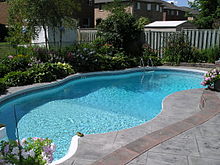

A staycation (a portmanteau of "stay" and "vacation"), or holistay (a portmanteau of "holiday" and "stay"), is a period in which an individual or family stays home and participates in leisure activities within day trip distance of their home and does not require overnight accommodation. In the UK, the term has increasingly come to refer to domestic tourism: taking a holiday in one's own country as opposed to traveling abroad, as well as to staying home and participating in leisure activities within day trip distance of home and not requiring overnight accommodation.
Common activities of a staycation include the use of a backyard pool, visits to local parks and museums, and attendance at local festivals and amusement parks. Some staycationers also like to follow a set of rules, such as setting a start and end date, planning ahead, and avoiding routine, with the goal of creating the feel of a traditional vacation.
Staycations achieved popularity in the U.S. during the Great Recession in the late 2000s. In 2020 staycations became common due to the COVID-19 pandemic.
Etymology
The word staycation is a portmanteau of stay (meaning stay-at-home) and vacation. The term daycation are also sometimes used. Merriam-Webster cites the earliest use in the 18 July 1944 Cincinnati Enquirer. The term was famously used by Canadian comedian Brent Butt in the television show Corner Gas, in the episode "Mail Fraud", which first aired 24 October 2005. The word became widely used in the United States during 2008, when gas prices reached record highs, leading many people to cut back on expenses including travel. The term was added to the 2009 version of the Merriam–Webster's Collegiate Dictionary. Lake Superior State University added the word to its 2009 List of Banished Words. The citation noted that vacation is not synonymous with travel, and thus a separate term isn't necessary to describe a vacation during which one stays at home.
Benefits
Staycations are likely to be less costly than a vacation involving traveling. There may be no lodging costs and travel expenses may be minimal. Costs may include transportation for local trips, dining, and local attractions. According to the American Automobile Association, "the average North American vacation will cost $244 per day for two people for lodging and meals" and "Add some kids and airfare, and a 10-day vacation could top $8,000."
Staycations are likely to avoid some of the stress associated with travel, such as jet lag, packing, long drives, or waits at airports.
Staycations may be of economic benefit to some local businesses, who get customers from the area providing them with business. In 2008, the tourism bureaus of many U.S. cities also began promoting staycations for their residents to help replace the tourism dollars lost from a drop in out-of-town visitors.
Risks
Staycationers may spend money they had not planned as retailers and other advertisers offer "deals" to encourage staycationers to spend money. Staycationers can also finish a stay-at-home vacation feeling unsatisfied if they allow themselves to fall into their daily monotony and include household projects, errands, and other tasks in their vacation at home or near home.
See also
References
- Heung, Sammy (15 June 2021). "Beware of Hong Kong hotels' staycation traps, consumer watchdog warns". South China Morning Post. Retrieved 14 August 2021.
- "Definition of Staycation". English Oxford Living Dictionaries. Archived from the original on 20 October 2017. Retrieved 22 April 2019.
- "Rallying call for UK 'staycation'". BBC News. 19 March 2009. Retrieved 15 August 2020.
- "UK holidaymakers opt for a 'staycation' in the Britain [sic]". The Guardian. 17 July 2009. Retrieved 15 August 2020.
- "STAYCATION noun definition and synonyms". Macmillan Dictionary macmillandictionary.com. Retrieved 2021-03-05.
- "Staycation definition and meaning". Collins English Dictionary collinsdictionary.com. Retrieved 2021-03-05.
- ^ Wixon, Matt (18 March 2009). The Great American Staycation: How to Make a Vacation at Home Fun for the Whole Family. Adams Media. ISBN 9781605506562.
- "Get away on vacation — at home". NBC News. 12 March 2008. Archived from the original on March 7, 2013. Retrieved 2 August 2016.
- ^ "The Ultimate Staycation Guide". Retrieved 25 September 2018.
- Farr, Christina (5 May 2020). "When will we start traveling again? Here's what experts are saying". CNBC. Retrieved 18 June 2020.
- "staycation". Word Spy. Retrieved 2 August 2016.
- ^ "Buzzword: Staycation". Consumer Reports Home & Garden Blog. Retrieved 2 August 2016.
- "The Secret History of 'Staycation'". Retrieved 2024-06-08.
- Goldman, David (2008-05-07). "Congress takes on gasoline prices". CNN. Retrieved 2010-05-24.
- "Locavores, staycations get official in dictionary". Reuters. 10 July 2009. Retrieved 2 August 2016.
- "Lake Superior State University 2009 List of Banished Words" 1 January 2009
- ^ "Avoiding high gas prices with a 'staycation'". NBC News. 29 May 2008. Archived from the original on March 5, 2016. Retrieved 2 August 2016.
- "Staycations: Alternative to pricey, stressful travel". CNN. 2008-06-12. Retrieved 2010-05-24.
- "Retailers promote 'staycation' sales". USA Today. 2008-05-23. Retrieved 2010-05-24.